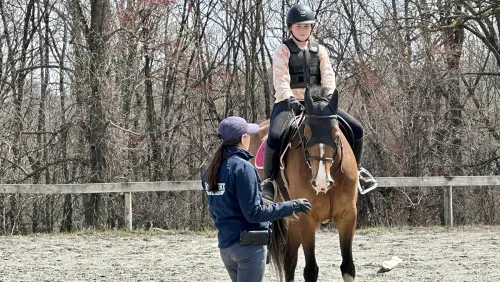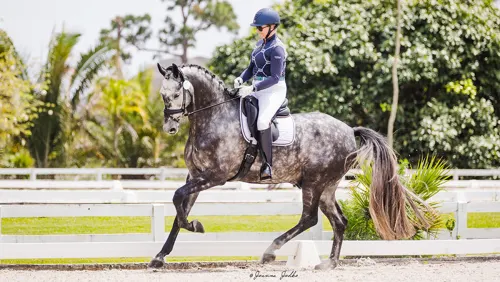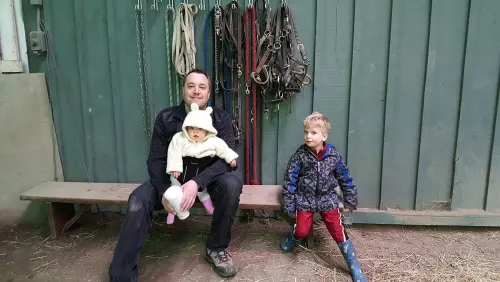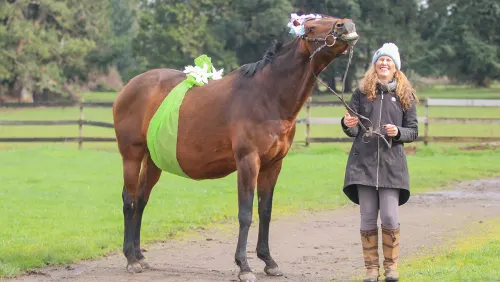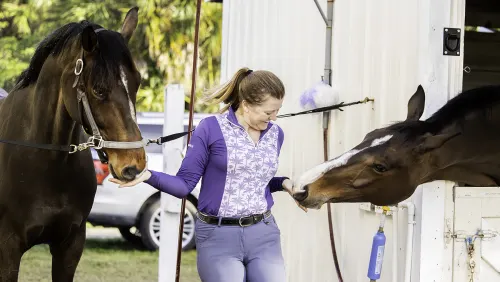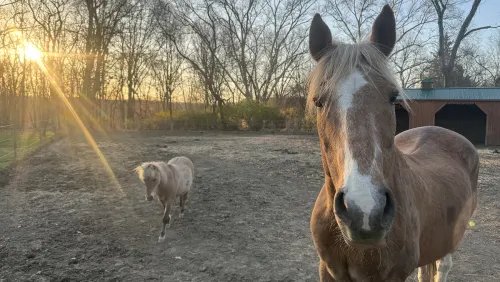Due to quite a lot of competing and traveling, it hasn’t been often lately that I could sit and write. However, don’t lose faith! I promise I’m still thinking, and I’m as hungry as ever to help the sport where I can. I’m planning to attend both the U.S. Eventing Association and U.S. Equestrian Federation conventions, but for the first time, I intend to speak up when the time comes. I encourage those who wish things to be different to do the same. Now is the time when your voice is needed!
After my last blog, I got several questions, the crux of which were: “Good point. Where do we start?” I think Gandhi said it best that we must “be the change we wish to see in the world.” This is applicable to all of us, but it specifically leads to three pledges that I will make for the New Year:
1) I will exhaustively search North American horse breeders and producers before my clients or I buy another gelding from overseas.
2) I will involve myself in a major event so that I might be able to help create the type of event that spectators will want to watch
3) I will involve myself in a USEF or USEA committee. From this, I hope to better understand the process and build the contacts necessary to improve collegiate equestrianism in the way I have proposed.
You will soon see that these pledges proposed are not completely altruistic. As a true stakeholder in North American equestrian development, I see these pledges as necessary, and ultimately in my own self-interest. And guess what—I’m completely OK with that! And why not? As discovered by John Forbes Nash, Jr., and made popular in the book and movie A Beautiful Mind, the best result is achieved when working in the best interest of both yourself and the group.
Buy Home-Grown
As a competitor and breeder, I’m completely fed up with the cost of importation. It is a huge tax we levy on our owners or ourselves and lowers the chance of either of us being pleased with the result. Additionally, we’re funding other countries’ breeding programs that are all too happy to continue beating us. I’m not suggesting we stop importing bloodlines, but we must stop importing geldings.
ADVERTISEMENT
There are plenty enough good horses here to not need to buy them from overseas. Yes, it might be faster or easier, but that really doesn’t make it better, and to be honest, the horses I’ve bought here have been equally as good as those I’ve imported. For one thing, I actually know these horses. I’ve seen them compete, often for some time. I know the trainers, both the good and the bad.
Second, and more worrying, I don’t know the European horses. Given that we no longer pay more than the Europeans can pay themselves, do you really think when you go to Europe you’re seeing the best? Can you tell enough in an hour about a horse to feel ready to buy it? Would you do the same thing here when looking at American horses? If you answered no to any of these questions then join my revolution!
While it may be good for you, it will also be good for North American trainers and breeders. The more of a market we create here, the better the standard of breeding will be, so everybody wins.
Make It Pay
The second of my pledges is also self-serving on many levels. I must digress for a moment before I tell you why. Here is a news flash: Our sport can be a money pit that I often have a hard time justifying to my family and myself. Lots of money seems to be changing hands, but nobody seems to be holding onto any of it. While this neither makes me love it less, nor changes my love for the horse, nor dampens my desire to strive, it IS a cold hard truth for many. If this dynamic doesn’t improve, the sport in this country will continue to struggle.
So what is the answer? Make it popular and make it pay. Though I know many people get gun-shy about prize money in the sport because of its effect on horsemanship, I say this: There are good and bad horsemen. There always have been and always will be. Over time, the good horsemen win more and understand that sometimes the best show is the one you don’t start. As unfortunate as pot hunting at the expense of the horse is, I really don’t think more money makes it that much more prevalent. If anything, preserving a good horse so that it has a long career is the most effective way of maximizing its earning potential.
Now we have tried (through the Professional Riders Organization and USEA) to provide prize money at shows, and while we appreciate those efforts, I don’t think they have been wholly successful. Why? Because they miss the point. What makes an event successful (like any other business), is paying customers (in our case, spectators).
The Rolex Kentucky CCI****, for example, can offer large prize money because it garners a large spectator base and therefore has the ability to attract big sponsors. Unfortunately, this model won’t work for other events around the country because the majority of Rolex’s spectators are eventing enthusiasts, and they’re likely to make only one big pilgrimage per year.
ADVERTISEMENT
In order for other events to work, we have to build a new regional model based on attracting local people from outside the sport. In order to accomplish this, we’ll need to fulfill the needs of people looking to either: a. Have a fun family outing, b. Have a nice event to attend as a corporate outing, or c. Entertain tailgaters. Events like Red Hills, Plantation Field and Galway Downs have begun this trend here in the United States. Boekelo, in the Netherlands, has taken it to the next level of spectator attendance by creating an atmosphere equally enjoyable for horse lovers and those new to the sport. Who’s to say that by combining the best ideas from all the top events and by thinking to ourselves, “What would make the best spectator event possible?” we can’t do more?
My feeling is that prize money should be grown out of the ability of an event to get paying spectators. When we find the formula that gets people through the gate consistently, big sponsorships and prize money will naturally follow. While the money does add interest and drama for the spectators, it certainly doesn’t matter how much money is given out if no one but competitors are there to watch it being won.
Because I strongly believe in this, I will get involved. It will be my primary mission to get spectators, and I will beg anyone committed to the sport to help with that goal. Further, I hope to enlist fellow riders to join me in this pursuit. If we can make one event other than Rolex successful with paying spectators, then we can use it as a model for the other events. Right now we have a fantastic sport, but a subpar spectator product. We must change this soon to remain relevant.
Get Involved
My third pledge stems from having no good answers to those that have written to me about my last blog post in which I called for collegiate equestrianism to be the breeding grounds for future Olympians. When asked by those interested, “Where do we start?” my answer was “I don’t know.” I believe this will take some level of cooperation between the USEF, U.S. Olympic Committee and the National Collegiate Athletic Association. Because I don’t know for sure, the only thing I can do to find out is get involved. As such, I have recently accepted a few positions on USEF and USOC committees. Hopefully I will find a way to make a difference and contribute to the future of the sport.
As the sport grows and develops a more sustainable business model, we will all do better both collectively AND individually. These are the steps I’m going to take. Join me, or find your own solutions. Either way, “be the change you wish to see in the world.”
Thank you for reading: Michael
Michael Pollard and his wife, Nathalie, run Chatsworth Stud, a breeding and training facility in Chatsworth, Ga. Michael, 31, is also the CEO of several carpet and equine-related businesses and a father of four. At 18, he jumped around the Rolex Kentucky CCI*** and won the Markham trophy as the highest-placed young rider. He was the U.S. Eventing Association’s Young Rider of the Year in 2001. In 2009, he won the Jersey Fresh CCI*** (N.J.), and in 2011, he was a member of the gold-medal U.S. team at the Pan American Games (Mexico).







